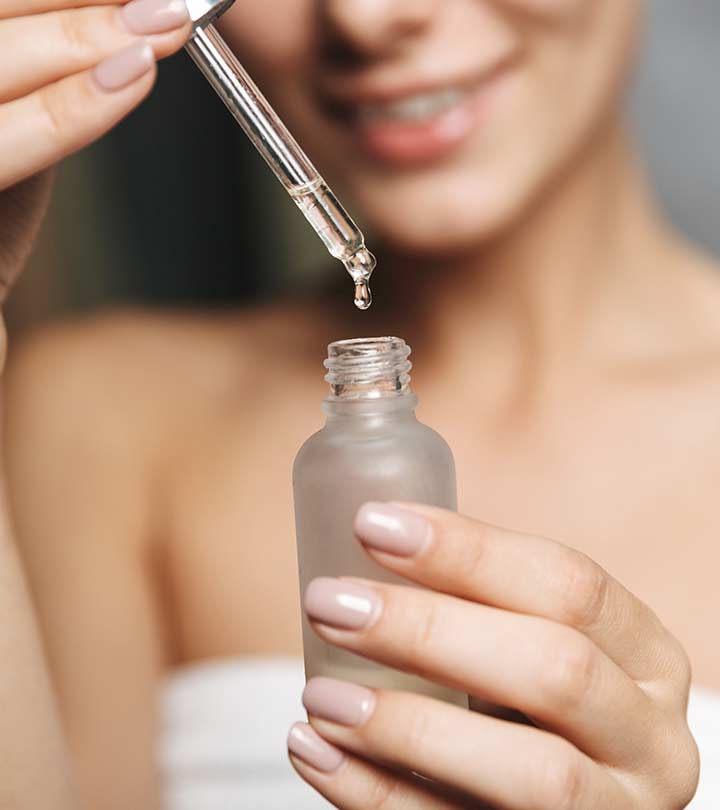Olive oil is commonly used in skin care and cosmetic products. The benefits of olive oil for skin can be attributed to its antibacterial and antioxidant properties – and its anti-inflammatory properties help manage skin conditions like eczema and psoriasis. You can attain its benefits with both topical application and ingestion. Continue reading to know more about the benefits of olive oil for skin.
Stylecraze TriviaEurope is a major contributor to global olive oil production. Spain produces over 56% of the world’s total olive oil production.
In This Article
Benefits Of Olive Oil For The Skin And Face
Shutterstock
1. Has Moisturizing Properties: Vegetable oils contain essential fatty acids (EFAs). EFAs are of great use in the production of cosmetics. They are used either as active incipients or raw materials to synthesize novel compounds. EFAs are easily integrated into the skin’s hydro-lipid film. They nourish, moisturize, and protect the skin (1).
2. Has Anti-Inflammatory Properties: Olive oil is a traditional treatment for wounds, sores, and infections. Various studies back the effectiveness of its topical use and absence of side effects. Olive has long been used to accelerate wound healing. It may be used for treating diabetic foot ulcers, atopic dermatitis, diaper dermatitis, episiotomy wounds, and nipple ulcers. It improves skin and mucous tissue damage and accelerates wound healing (2).
Related: 13 Home Remedies To Heal Leg Ulcers And Prevention Tips
3. Is Rich In Nutrients: Olive oil comes from the fruits of Olea europaea trees. It consists mainly of oleic acid, with smaller quantities of other fatty acids such as linoleic acid and palmitic acid (3). Olive oil contains more than 200 different chemical compounds – including sterols, carotenoids, triterpenic alcohols, and phenolic compounds.
Shutterstock
4. Has Antioxidant Properties: Olive oil contains abundant hydrophilic phenols with higher antioxidant properties than vitamin E. These antioxidants exhibit anti-inflammatory properties if olive oil is included in the diet.
Related: 24 Best Vitamin E-Rich Foods You Should Include In Your Diet
5. Has Anti-Aging Properties: Olive oil may regulate skin aging with its antioxidant and stabilizing action on the cellular membranes (1). According to a study, extra virgin olive oil applied to the skin delayed the onset of skin cancer when exposed to UVB radiation (3).
Shutterstock
6. May Soothe Skin Conditions: Olive oil may help manage a few skin conditions (2). Olives may treat inflammation caused by diapers in children. The squalene in olive oil has antioxidant and moisturizing properties and can treat seborrheic dermatitis, acne, psoriasis, and atopic dermatitis. However, the treatment is in conjunction with other treatment modalities and is not standalone. Thus, using just olive oil may not be as effective in soothing inflammation.
7. Has Antimicrobial Properties: The hydroxytyrosol in olive oil is a good antimicrobial agent for treating human infections. Studies also support the antifungal properties of the oil (4).
8. May Improve Overall Skin Health: Olive oil is good for overall skin health. It moisturizes the skin and prevents early aging. It protects skin from UV light. The oil also contains oleuropein that acts as a potent scavenger of oxygen free radicals (5). This way, it may boost overall skin health.
Shutterstock
9. May Treat Burns: In a randomized controlled trial, a mixture of olive oil, sesame oil, and honey was demonstrated to be a useful treatment for burns. The mixture prevented infections, accelerated tissue repair, and facilitated debridement (6).
Stylecraze TriviaOlive oil has been used for skin care since ancient times. Egyptian Pharaohs used it with beeswax and other ingredients to moisturize and protect their skin.
You can enjoy all the benefits of olive oil when you learn how to use it on your skin efficiently. Learn more in the next section.
Related: How To Treat Burns At Home – 13 Natural Remedies To Try
How To Use Olive Oil For The Skin
Shutterstock
- You can apply olive oil to your skin directly to moisturize it. Massage the olive oil over the skin in small gentle circular motions.
- You can add olive oil to your skin care products and homemade face packs and masks.
- You can also mix olive oil with other natural ingredients like orange juice, lemon juice, green tea, pink salt, etc.
- You can use olive oil as the base with other essential oils.
One of the best ways to incorporate olive oil into your skin care regimen is using it in a homemade facemask. Learn to make one in the next section.
How To Make An Olive Oil Face Mask
What You Need
- 1 tablespoon of olive oil
- 1 teaspoon of honey
- ½ a teaspoon of orange zest (fresh)
- 1 egg yolk (for dry skin)
- Vitamin E capsule
Note: You can replace the egg yolk with paste of egg white if you have oily skin.
Procedure
- Mix the olive oil and honey with some freshly grated orange zest.
- Add in the vitamin E from the capsule.
- Beat the egg yolk into the mixture.
- Whisk the mixture until it is blended.
- Apply the mixture to your face and neck. You can use your fingers or a brush.
- Leave it on for 20 minutes, and wash off with warm water.
- Rinse off with cold water.
Can olive oil harm your skin? Continue reading to know the answer.
Risks And Side Effects
Treatment with olive oil has no potential side effects. Olive oil does not burn or traumatize the skin (1). But perform a patch test to be on the safe side. Apply a little olive oil to your skin and wait for a few minutes. Check for any adverse effects like redness, irritation, swelling, burning, or inflammation.
Subscribe
Conclusion
Olive oil is good for the skin. It is used in most skin care and cosmetic products. The antibacterial and antioxidant properties of olive oil protect the skin. The oil also helps manage conditions like eczema and psoriasis. Anecdotal evidence supports the use of olive oil in treating acne as well. However, consult a dermatologist and perform a patch test before using the oil.




